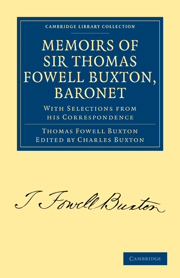Book contents
- Frontmatter
- PREFACE
- Contents
- CHAPTER I 1786–1802
- CHAPTER II 1802–1807
- CHAPTER III 1807–1812
- CHAPTER IV 1812–1816
- CHAPTER V 1816–1817
- CHAPTER VI 1818, 1819
- CHAPTER VII 1820, 1821
- CHAPTER VIII 1821–1823
- CHAPTER IX 1823–1826
- CHAPTER X 1822–1826
- CHAPTER XI 1826, 1827
- CHAPTER XII 1827, 1828
- CHAPTER XIII 1828, 1829
- CHAPTER XIV 1829
- CHAPTER XV 1829, 1830
- CHAPTER XVI 1830
- CHAPTER XVII 1831
- CHAPTER XVIII 1832
- CHAPTER XIX 1833
- CHAPTER XX 1833
- CHAPTER XXI 1833, 1834
- CHAPTER XXII 1834, 1835
- CHAPTER XXIII 1835, 1836
- CHAPTER XXIV 1836
- CHAPTER XXV 1837, 1838
- CHAPTER XXVI 1838
- CHAPTER XXVII 1838, 1839
- CHAPTER XXVIII 1839, 1840
- CHAPTER XXIX 1840
- CHAPTER XXX JUNE, 1840, TO APRIL, 1841
- CHAPTER XXXI 1841
- CHAPTER XXXII 1843, 1844
- CHAPTER XXXIII 1843, 1844, 1845
- RECOLLECTIONS OF SIR T. FOWELL BUXTON
- APPENDIX TO CHAP. XVII
CHAPTER XXII - 1834, 1835
Published online by Cambridge University Press: 05 July 2011
- Frontmatter
- PREFACE
- Contents
- CHAPTER I 1786–1802
- CHAPTER II 1802–1807
- CHAPTER III 1807–1812
- CHAPTER IV 1812–1816
- CHAPTER V 1816–1817
- CHAPTER VI 1818, 1819
- CHAPTER VII 1820, 1821
- CHAPTER VIII 1821–1823
- CHAPTER IX 1823–1826
- CHAPTER X 1822–1826
- CHAPTER XI 1826, 1827
- CHAPTER XII 1827, 1828
- CHAPTER XIII 1828, 1829
- CHAPTER XIV 1829
- CHAPTER XV 1829, 1830
- CHAPTER XVI 1830
- CHAPTER XVII 1831
- CHAPTER XVIII 1832
- CHAPTER XIX 1833
- CHAPTER XX 1833
- CHAPTER XXI 1833, 1834
- CHAPTER XXII 1834, 1835
- CHAPTER XXIII 1835, 1836
- CHAPTER XXIV 1836
- CHAPTER XXV 1837, 1838
- CHAPTER XXVI 1838
- CHAPTER XXVII 1838, 1839
- CHAPTER XXVIII 1839, 1840
- CHAPTER XXIX 1840
- CHAPTER XXX JUNE, 1840, TO APRIL, 1841
- CHAPTER XXXI 1841
- CHAPTER XXXII 1843, 1844
- CHAPTER XXXIII 1843, 1844, 1845
- RECOLLECTIONS OF SIR T. FOWELL BUXTON
- APPENDIX TO CHAP. XVII
Summary
Although the summer of 1834 was mainly occupied by Mr. Buxton in endeavours to complete the great work of emancipation; yet his mind was much occupied by a new undertaking, which, however, was in many respects similar to that upon which he had been engaged.
This was an inquiry into the condition and treatment of the aboriginal inhabitants of our colonies; a subject peculiarly calculated to arouse his interest, and, indeed, to excite his indignation. “I protest,” he said, “I hate shooting innocent savages worse than slavery itself.”
He thus concludes a long paper of meditations, dated January, 1834:—
“Though I practise not, I see what a noble course there is opened for me; and if I have a desire, it is that by the instrumentality of thy grace, O Lord, thou wouldest mould me into a man who is altogether thy servant, in temper, in objects of pursuit, in labours, in meekness, in charity, in faith, in godliness, in prayer, and in practice, directing my steps heavenward.
“My attention has been drawn of late to the wickedness of our proceedings as a nation, towards the ignorant and barbarous natives of countries on which we seize. What have we Christians done for them? We have usurped their lands, kidnapped, enslaved, and murdered themselves. The greatest of their crimes is that they sometimes trespass into the lands of their forefathers; and the very greatest of their misfortunes is that they have ever become acquainted with Christians. Shame on such Christianity! My object is to inquire into past proceedings, for the purpose of instituting certain rules and laws, on principles of justice, for the future treatment of the aborigines of those countries where we make settlements. […] ”
- Type
- Chapter
- Information
- Memoirs of Sir Thomas Fowell Buxton, BaronetWith Selections from his Correspondence, pp. 359 - 373Publisher: Cambridge University PressPrint publication year: 2010First published in: 1848

